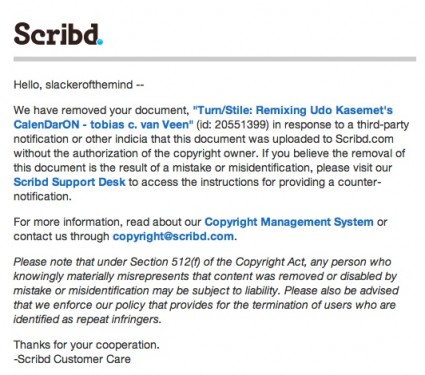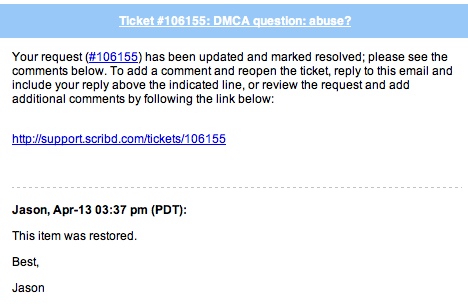
\ I’m not sure what to say about this, considering that the essay existed in PDF form not from Leonardo but from my own Word document. Leonardo never even gave me a PDF, nor a Galley proof, for that matter. Is it Leonardo / MIT Press that is blanket-searching Scribd for phrases that may correspond to their own published material?
If so, I never signed over copyright to them [see below]—I wasn’t paid for this piece, nor was it printed on paper. It was relegated to an abstract at the back of the printed Journal, with the piece distributed over email and online. It lacked proper formatting and remained generally unread because of its poor presentation. From what I remember of discussions with other authors, those of us who were “bumped” in this manner were not impressed. This is precisely why I am behind cracking open the locked vaults of academic knowledge. Enough overpaid subscriptions to ivory towers. Viva Open Access Publishing!
As far as I am concerned, this is censorship—not of the malicious, targeted-kind, as if I am spreading some kind of samizdat here, but of the dumb, computers-are-fucking-us-over-kind, aided & abetted by some lawyer somewhere who is currently earning more than all the authors he is screwing-blind combined. Thus I proudly present the paper in its pirate lair, where it has been drinking merrily for years:
Turn/Stile: Remixing Udo Kasemets’ CaleNdarON
Leonardo Music Journal 13; Leonardo Electronic Almanac: Groove Pit and Wave. MIT P: 2003/2004.
The more these commercial distribution services like Youtube, Soundcloud, etc, pander to blanket-DMCA requests generated by some robot somewhere, the more it forces a redistribution into decentralized nodes of underground information. Just imagine—in the future, you won’t even be able to use citation on a blog as the Internet Robot will immediately recognise the use of someone’s words without permission. (Remember, Hallmark owns the copyright to “Happy Birthday”…).
Think it won’t happen? Think again. Because when machines do the reading, they don’t think—they just execute a binary decision based upon a percentile of a parameter matched. Think about that. The technocracy is indeed a troubling concern.
../../
23 March 2011: An update–see my counter-file DMCA notice. I did sign over copyright to ISAST, but I retain specific rights which, as I interpret it, include publishing the article in my own “anthology” on Scribd. For what it’s worth, I don’t think I’d sign such a broad agreement today for an unpaid piece that does not guarantee (a) a publication format; (b) reversion of rights to author should the Press fail to keep the work in print; (c) renumeration rights for paid electronic distribution services (i.e. Kindle); and (d) the right to electronically distribute for educational and academic purposes (not just “photocopy” for teaching—note the imbalance of rights, where the publisher retains all future-forward electronic rights of distribution while the author can only photocopy as a means of distributing their own article for teaching purposes!). From the Publication Agreement:
Agreement: We are pleased to have the privilege of publishing your Article in a forthcoming issue of Leonardo Music Journal. By your signature below, you hereby grant all your right, title, and interest including copyright for the text, layout, and image placement of the Article, to The International Society for the Arts Sciences and Technology (ISAST).
Rights Reserved by Author: You hereby retain and reserve for yourself a non-exclusive license: 1.) to photocopy the Article for use in your own teaching activities as long as the article is not offered for sale, and 2.) to publish the Article, or permit it to be published, as a part of any book you may write, or in any anthology of which you are an editor, in which the Article is included or which expands or elaborates on the Article, unless the anthology is drawn primarily from Leonardo Music Journal. As a condition of reserving this right, you agree that MIT Press and Leonardo Music Journal will be given first publication credit, and proper copyright notice will be displayed on the work (both on the work as a whole and, where applicable, on the Article as well) whenever such publication occurs.
It’s worth reiterating that I gave MIT Press free content. Their DMCA shennanigans strikes at the very core of why academics publish: to see the work distributed and archived. To this end, MIT Press is not meeting its obligations, as the content is no longer available online. This is the link provided for the article; it no longer exists:
http://mitpress2.mit.edu/e-journals/LEA/TEXT/Vol_12/lea_v12_n02.txt
So after failing to distribute and archive the article, MIT Press then strikes it off the Net with a DMCA. Why? I believe the answer is here:
With the re-launch of the Leonardo Electronic Almanac (LEA) we inherited a rich historical collection of writings and thematic issues that spans twenty years.
Historical collections, particularly historical collections of digital media hosted over the Internet, have had a tendency to disappear with the closure of a server or to be left abandoned on a database hosted on the hard drive of a dusty computer in the department of a university. The editorial choice for LEA was not simply that of re-presenting the same material, but to propose to the academic, artistic and scientific communities to re-engage with issues and themes 20 years later. The idea is to develop new discourses, re-attempt to put to rest old diatribes and to engage with the developments in the field of the interactions between art, science and technology.
The editorial choice I made was to collect the old material and make it available on Kindle, remediating the old format and rekindling old arguments and passions by finalizing arguments that appear to no longer have relevance and by breathing new life in to historical subject areas that are still relevant today, picking up from the threads left by the pioneers and commentators of the recent past. [Lanfranco Aceti, Editor-in-Chief, LEA]
What does this mean? It means that Leonardo/MIT Press/ISAST failed to keep up their end of the publishing contract, which is to maintain the electronic source online. Since they’ve now repackaged the lot and published it with Kindle, they’ve got the lawyers hopping across the internets striking down the content that authors have since self-published or otherwise distributed due to the complete failure of LEA to maintain a proper digital archive.
And that, my friends, is why closed academic publishing in a digital, online environment is a complete mistake. Don’t sign such agreements. Renegotiate. Nobody wants their work locked up on some “dusty computer in the department of a university”, which is precisely what the LEA has done. Republishing on Kindle is not sufficient, in my opinion, to uphold the original contract, which called for online publication in the Journal. So where are the LEA’s archives? Why is content dating back to the early ’90s being sold when the content was never paid for to begin with? Why isn’t the LEA making such content free and open to the public?
Indeed.
././.








 RT
RT 